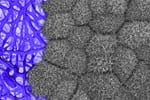27 Oct Cellular Dynamics awarded $1.2 million contract from National Eye Institute
 Cellular Dynamics International (CDI), today announced that the National Eye Institute (NEI), a division of the National Institutes of Health (NIH), awarded the company a $1.2 million contract to manufacture clinically compatible induced pluripotent stem cells (iPSCs) and iPSC-derived human retinal pigment epithelial (RPE) cells. These cells will be manufactured from individuals suffering from dry age-related macular degeneration (AMD) and will be used for investigational new drug (IND) enabling studies. Once the IND is approved, the same procedures will be used to generate clinical-grade iPSC-derived RPE tissue for transplantation into AMD patients. This process, known as autologous cellular therapy, would be the first of its kind in the U.S.
Cellular Dynamics International (CDI), today announced that the National Eye Institute (NEI), a division of the National Institutes of Health (NIH), awarded the company a $1.2 million contract to manufacture clinically compatible induced pluripotent stem cells (iPSCs) and iPSC-derived human retinal pigment epithelial (RPE) cells. These cells will be manufactured from individuals suffering from dry age-related macular degeneration (AMD) and will be used for investigational new drug (IND) enabling studies. Once the IND is approved, the same procedures will be used to generate clinical-grade iPSC-derived RPE tissue for transplantation into AMD patients. This process, known as autologous cellular therapy, would be the first of its kind in the U.S.
CDI will use its expertise to reprogram skin and blood samples from individuals with AMD to create clinically compatible, autologous iPSCs, which are genetically identical to the individual. As a genetic match to the patient, these cells are intended to reduce the risk of transplant rejection. NEI researchers plan to use these cells as part of their pre-clinical process to develop the first autologous cell transplantation treatment for dry AMD.
Key points:
- The clinically compatible RPE cells resulting from CDI’s protocol development and optimization, when manufactured under cGMP conditions, would likely be the first iPSC-based, autologous cellular therapeutic candidates transplanted into humans in a Phase I clinical trial in the U.S.
- The contract funds the manufacture of clinically compatible iPSCs and the development and manufacture of clinically compatible iPSC-derived human RPE cells by CDI. The RPE manufacturing process is based on iPSC-RPE differentiation methods developed and authenticated by NEI.
- CDI will use existing NEI differentiation protocols to develop and optimize the methods for manufacturing RPE cells and provide NEI with cGMP-ready protocols and training for their manufacture.
- Researchers at NEI will use the RPE cells that CDI manufactures for preclinical studies in preparation for a clinical trial that will test these cells in patients with dry AMD. AMD is the leading cause of vision loss in people aged 60 and older, and as many as 11 million Americans have some form of macular degeneration, according to the Bright Focus Foundation.
- There are currently no FDA-approved therapies for dry AMD, which accounts for about 90% of AMD cases. Therapies for wet AMD require repeated eye injections that slow or, at best, arrest disease progression. Revenues for wet AMD products were more than $5.75 billion in 2013.


